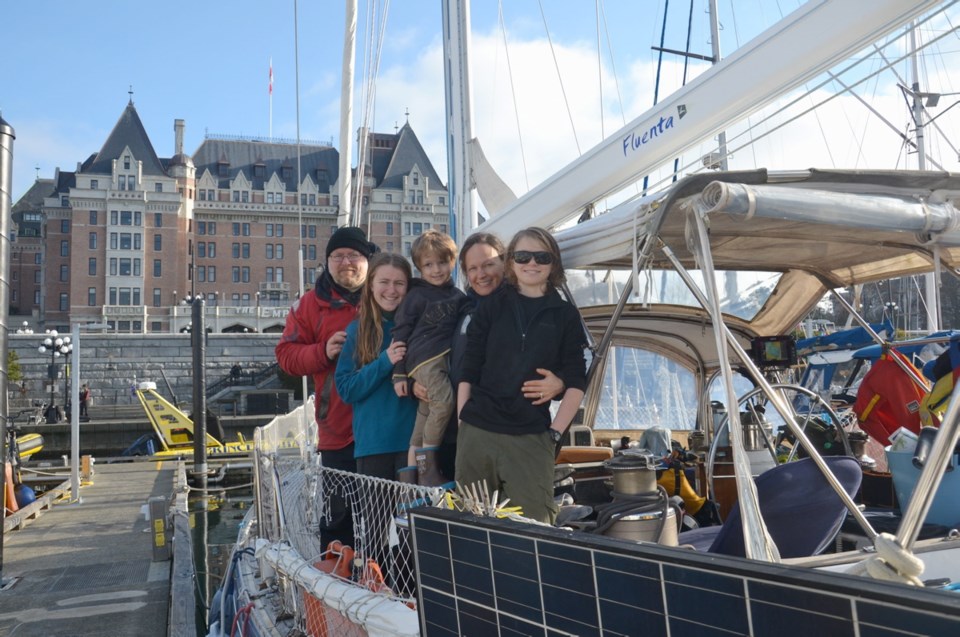Take things slowly, stay informed and consider how your actions affect the people around you: that’s the advice of a Sidney-based family well poised to offer tips to British Columbians as they begin to venture out of self-isolation.
The Shaw family — mom Elizabeth, dad Max and kids Victoria, 16, Johnathan, 14, and Benjamin, 6 — recently settled in Sidney after spending seven years sailing around the world on a 14-metre boat.
It was a bit of a transition to adjust from spending long days with only each other on the three-cabin boat to going to school for the first time in seven years.
Stepping out of her classroom on the first day in February, Victoria was shocked at the sheer volume of bodies.
“It was literally lanes of traffic in the hallways,” she said.
Her younger brother was also taken aback by the crowds.
“I hadn’t seen that many kids since we left,” Johnathan said.
Their experience is an extreme example of how some in B.C. might feel as they poke their heads out of their homes after two months mostly indoors and resume old activities like dining out, working out and returning to school and work.
B.C. enters phase 2 of its restart plan today, which will allow restaurants, stores, salons and gyms to open.
“Be patient with the process and be patient with the people and give things the time that it takes,” Elizabeth said. “Things don’t just change in a moment.”
The lessons they learned during years of navigating the South Pacific as a family will help to guide them again as the province begins to restart the economy.
Elizabeth likened the unknown territory that everyone is living in, as COVID-19 restrictions begin to lift, to entering an unknown lagoon on the boat; she urged people to use caution and look out for each other.
“Don’t go into an unknown, new place until you’ve had a chance to really suss it out,” she said. “Tread conservatively wherever it is that you choose to go.”
Before they travelled to each new small island community in the South Pacific and Micronesia, they learned as much as they could about the place, the local people and customs and how to be good visitors. Some of that applies to the current situation, Max said, especially as British Columbians start to think about travelling a little farther from home.
Just as the Shaw family considered how to minimize their impact on the places and people they visited, reducing the risk of COVID-19 will require everyone to be aware of how their actions affect others.
“In this case, we need to be considerate of the people around us,” Elizabeth said. “So that may well translate into keeping more distance than we’re used to keeping or wearing a mask that were not used to wearing, and doing it out of consideration for other people as opposed to just thinking about what would I like to do for myself.”
Provincial officials have asked British Columbians to stay informed about public health recommendations and use their own judgment to assess risk and make decisions about what to do and who to see.
Risk assessment was a lesson Elizabeth and Max taught their young kids several years ago when they first visited countries that had fewer safety regulations than Canada has.
“We explained to them that it wasn’t the first world where there’s a big sign that says this is dangerous and rules that [say] don’t do this. It was more reliant on the individual to not fall off the concrete pier or not to walk through an industrial area,” Max said. “They had to be aware of their surroundings and understand the risks. So, I think it’ll be a lot like that as things open up.”
As parents of three kids who have been homeschooled for the majority of their lives, Elizabeth and Max have some tips for parents suddenly thrust into the situation.
Worksheets and assignments aren’t the biggest learning opportunities during the pandemic, Elizabeth said. Instead, parents can use the experience to focus on building life skills, such as how to be resilient.
“It’s learning about how do we pull together, and how do we support one another? And how do we find things to do together?” she said. “And how do we find a way to constructively handle this new situation that was passed to us? And to me, those are the more important lessons to be teaching our kids.”
Businesses may be slowly reopening, but people will continue to spend much more time at home than they have in the past until there’s a significant level of immunity to the virus. It’s something the Shaw family is pretty good at after sharing three small cabins for seven years.
Having hobbies that you can enjoy on your own at home and learning to let go of grudges quickly are key to staying happy and sane, Victoria said.
And if you’re really running out of things to do, she has a simple piece of advice: “Find a good book.”



